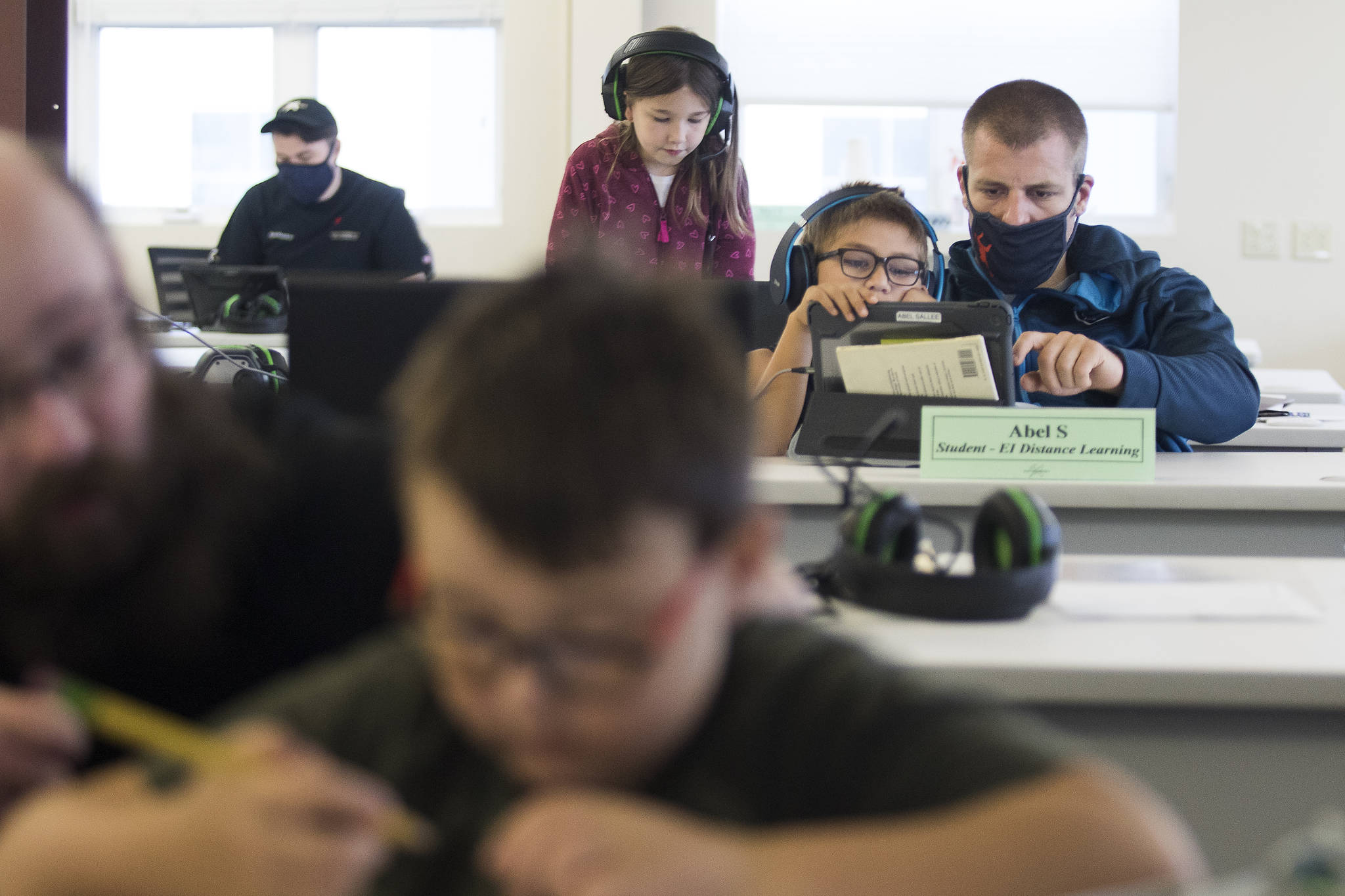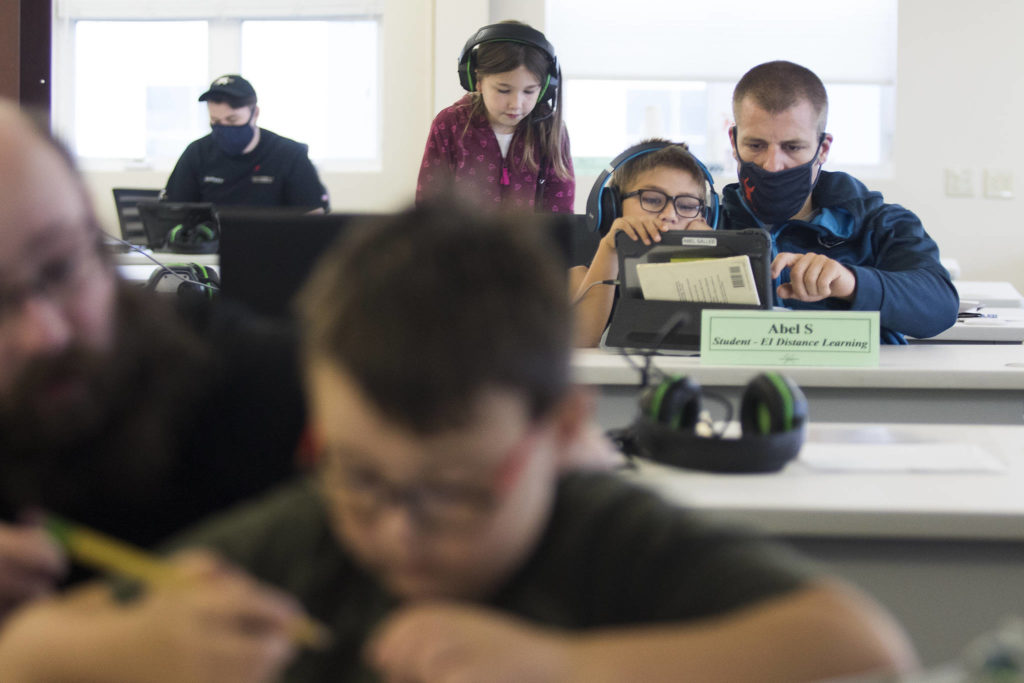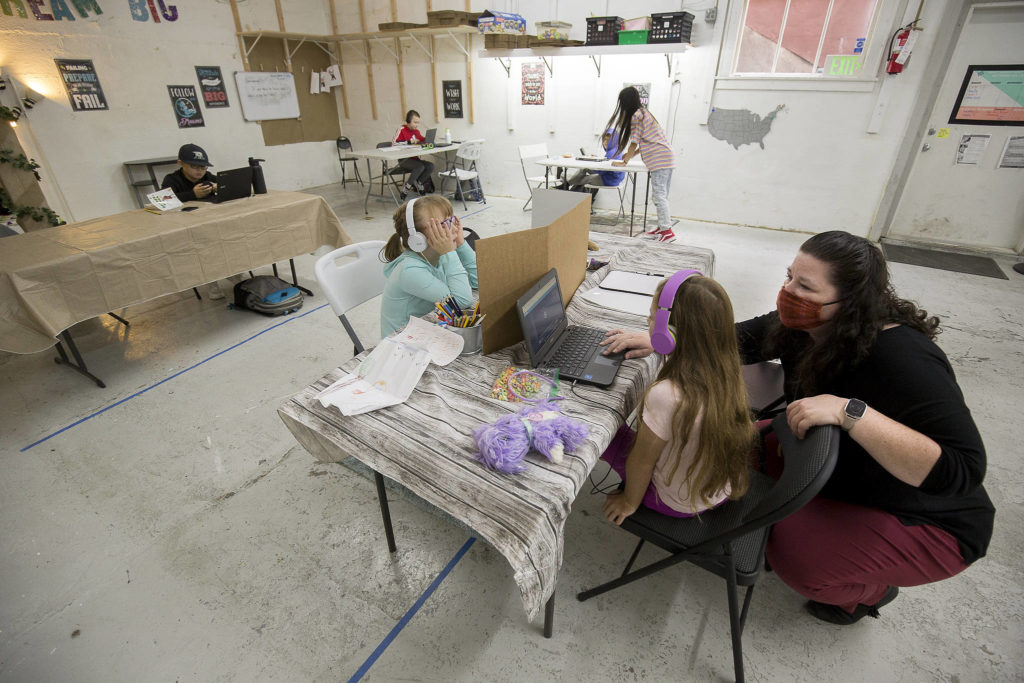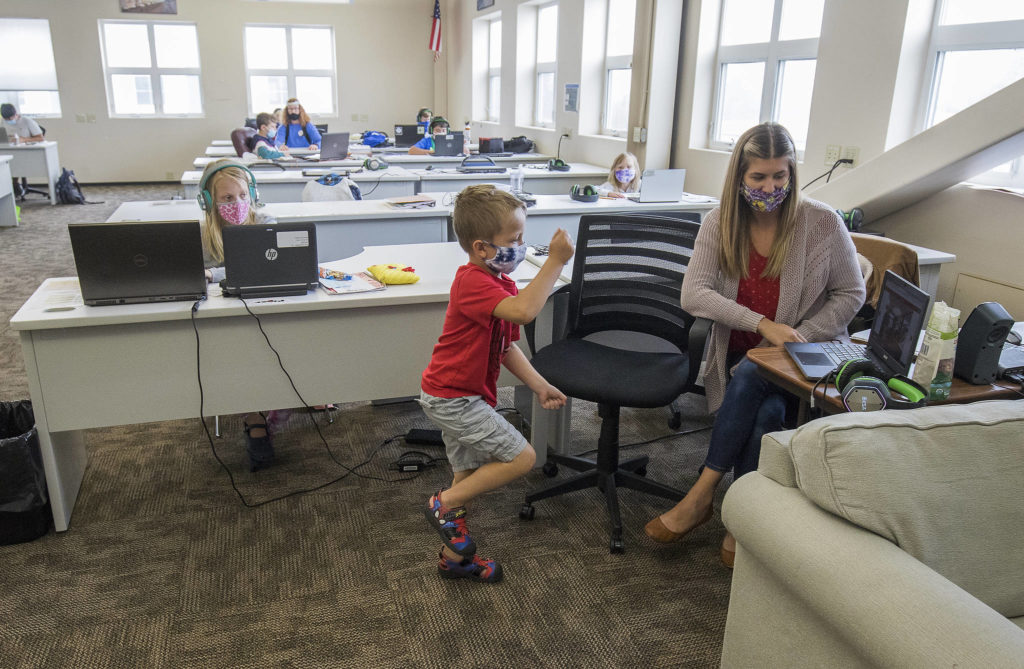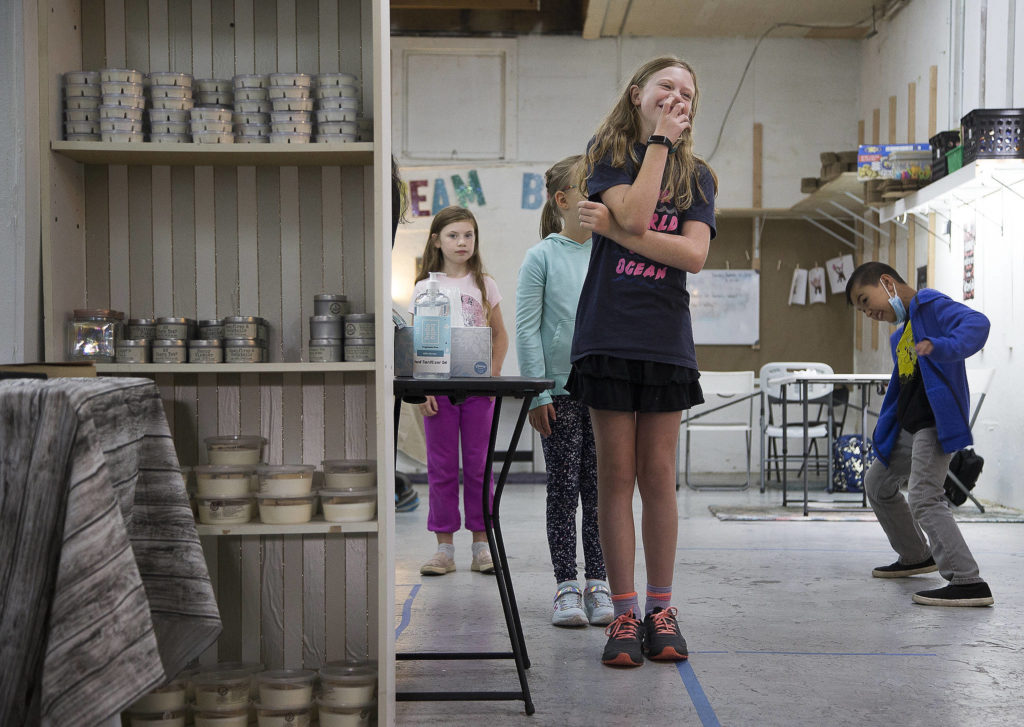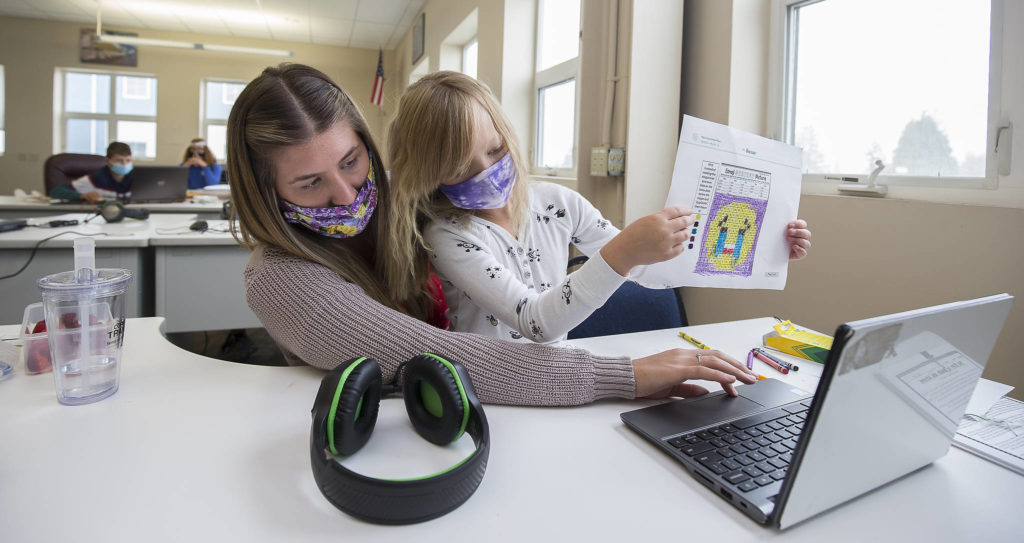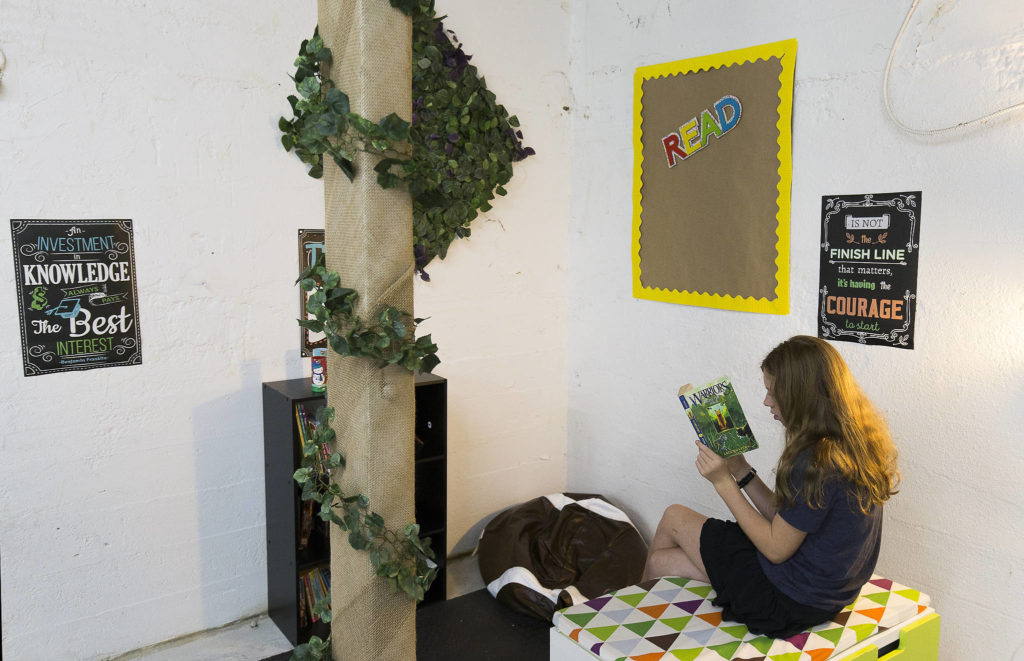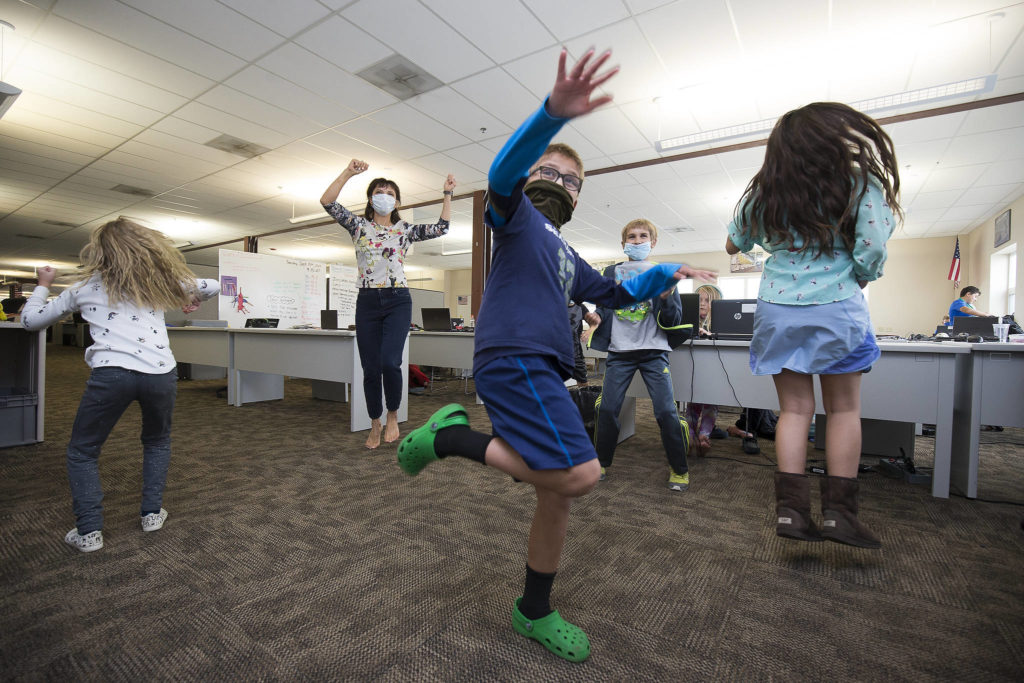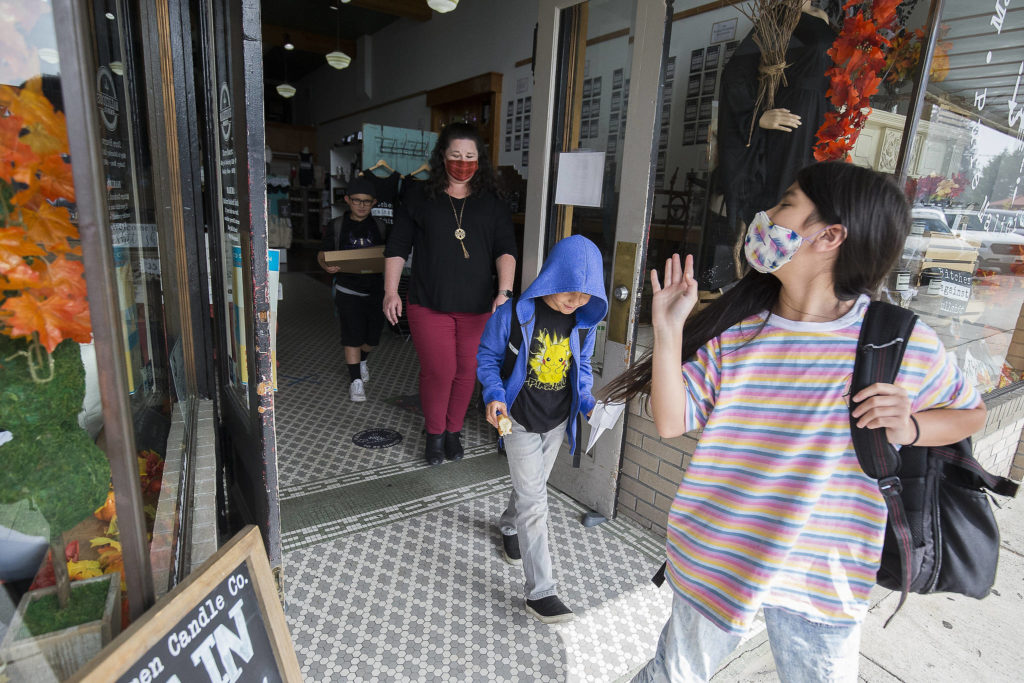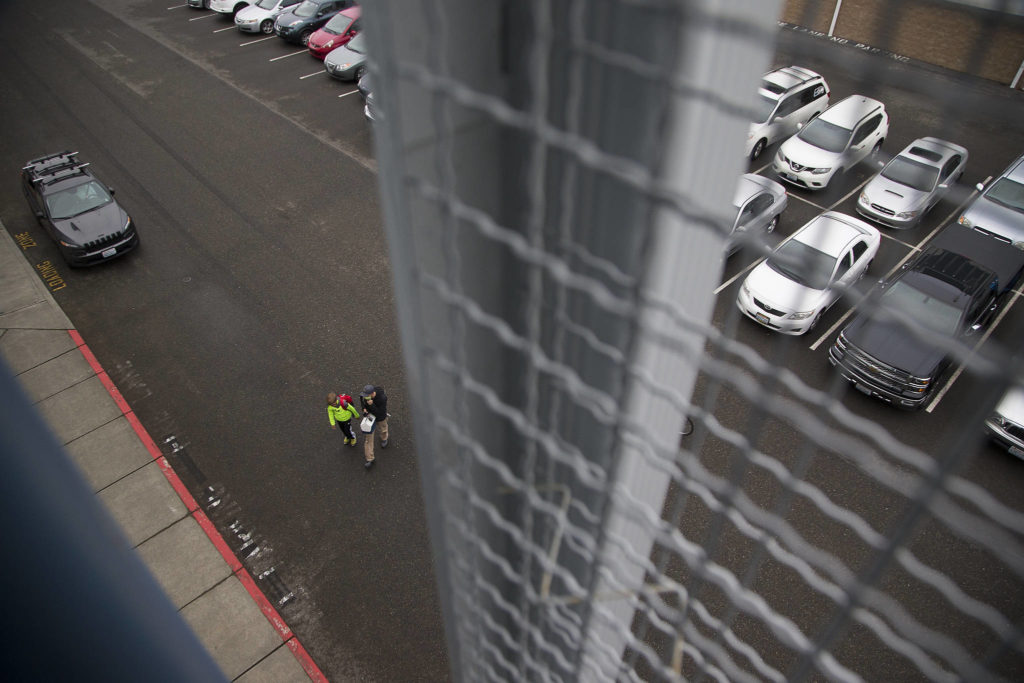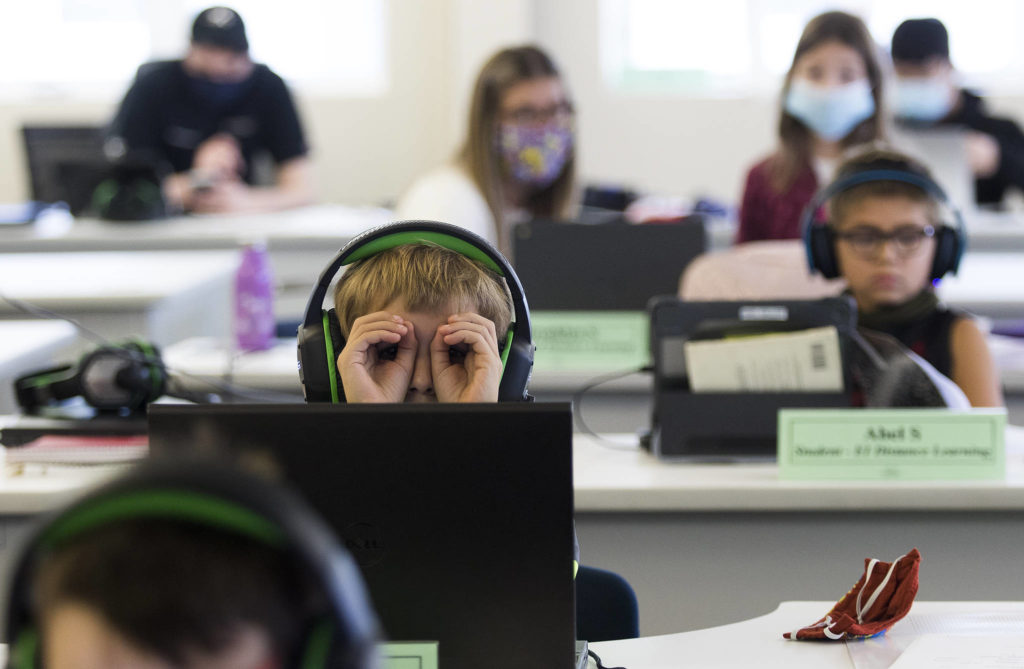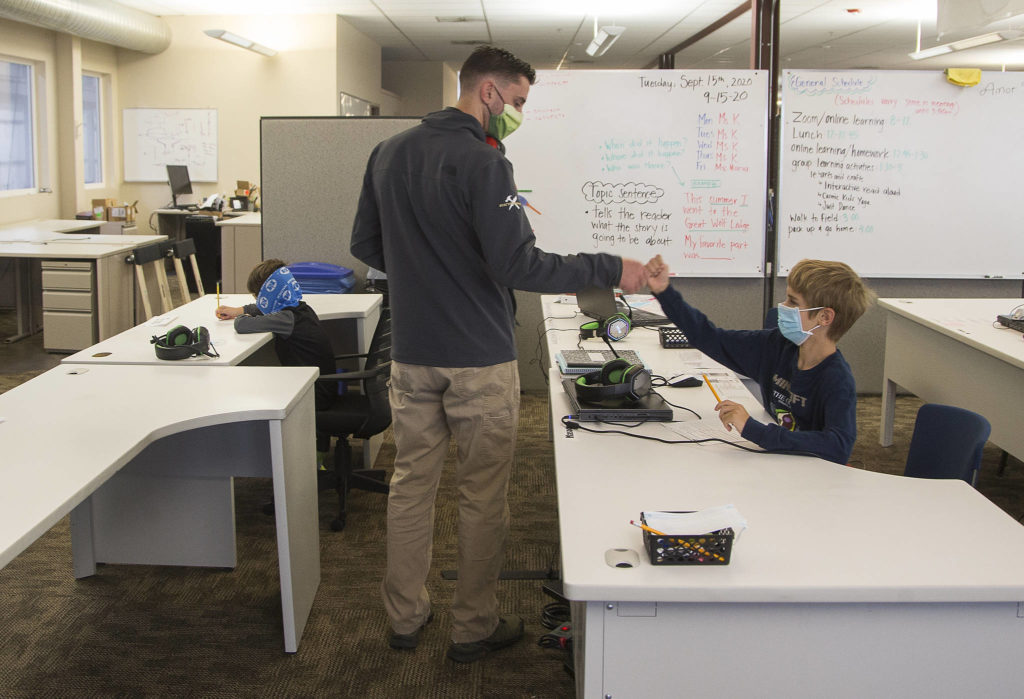SNOHOMISH — Back-to-school looked a lot different this year.
For 20 students in first through ninth grades, it meant reporting to the third floor of Electroimpact, an industrial aerospace company in the Mukilteo suburbs.
Meanwhile, in downtown Snohomish, seven kids kicked off the year doing Zoom classes in the back room of Malicious Women Co., a boutique candle shop.
With the pandemic delaying traditional in-person instruction, those companies and others set up supervised rooms on-site for workers’ children to do remote classes with their public schools.
As students did virtual studies in a classroom-setting with hands-on help, some bosses got a crash course in health codes and zoning laws — and how easy it is to unknowingly be in violation.
For Electroimpact, that meant closing its education pod after a month. In Snohomish, classes continue at the candle shop.
A classroom in a workroom is new territory in the wild west of COVID-19. It’s unknown how many pods are out there, not only at workplaces, but also at churches and in private homes.
That raised concerns from the Snohomish Health District, which recently issued guidance for employees and employers.
“Our goal isn’t to inhibit entrepreneurship,” district spokesperson Heather Thomas said. “We understand they are trying to do the best for their employees and the kiddos but we want to make sure it is being done safely.”
State law requires any person or entity who provides child care outside a child’s home, such as an employer, to be licensed by the Department of Children, Youth, and Families. There are some exemptions.
The children must abide by workplace rules, Thomas said.
“They have to follow the same procedures, face masks or whether it is temperature checks or symptom screening,” she said. “Employers should talk to their insurance company or legal to see if from a risk management there’s anything they need to be aware of.”
A Snohomish County lawyer who initially expressed interest in being part of this story backed out. He grew concerned that the attention might get his pod of six students shut down, leaving his employees without a way to work and educate their kids.
“Then what?” he said.
A new campus
Peter Zieve, president of Electroimpact, knew he faced a dilemma after learning in August that schools would be remote this fall.
“That was like a bombshell for me, because that would mean the employees can’t come to work, they’d be home helping their kids do the online education,” Zieve said last month. “Well, that’s no good, because we can’t get anything done that way.”
The company he started in 1986 employs about 400 at its Mukilteo facility. In September, 20 students attended class for free at a learning center set up on the campus.
Zieve — a former unsuccessful political candidate, who has opposed low-income housing and a mosque being built in Mukilteo — said COVID-19 isn’t the biggest threat to students.
In Zieve’s opinion, the risk of COVID for kids is secondary to the negative impacts of social isolation. Two of his children and some of their friends attended online classes from Electroimpact.
“The tradeoff is obvious, we’ve got to get the kids together,” he said.
Zieve said ideally the learning center would go away once schools reopened, but action by local officials expedited the closure. Late last month, Electroimpact received notice from the county health district and the city of Mukilteo about potential code violations.
Without a child care license, the learning center can’t be open for more than four hours a day by Washington state law. The city also had safety concerns.
Mukilteo Mayor Jennifer Gregerson commended Zieve for providing a beneficial service for his employees, but said the city’s job is to ensure it is safe and working right.
At Malicious Women Co., the pandemic disrupted workflow for several months at the fast-growing company with a close-knit group of 23 workers.
“It was tough to get through quarantine,” founder Lacie Marsh-Carroll said. “We are still a small business trying to recover.”
Her company makes candles scented with custom fragrances and edgy sayings. Colorful language touches on topics such as parenthood, cancer, weddings, military and recovery.
The candles began as a way for Marsh-Carroll, 45, then a quality engineer at Boeing, to work through grief following the 2016 suicide of her best friend and the stress of family health issues. She melted wax in a Crock-Pot in her kitchen and put sassy labels on vintage jars for friends, who posted photos on Facebook. Other people wanted one.
After candlemaking took over her house, she opened a store in Lake Stevens, outgrew that and set up shop in Snohomish, where she recently expanded to a 7,500-square-foot production space in addition to the retail store. The company has 1,000 wholesale partners and sells other Malicious products such as cosmetics and bath bombs.
The decision for schools to operate remotely could have meant some workers had to choose between earning a paycheck or being home with their children.
“I said, ‘No, not on my watch,’” said Marsh-Carroll, whose three kids are adults.
The cost is $50 a week per family.
“This has enabled moms to be able to go to work knowing that their children are going to meet their Zoom classes and get their homework done, and then they don’t have to be homeschool teachers when they get home from an 8-hour day,” Marsh-Carroll said. “It gives the kids a little slice of normalcy. They get up, go to school, come home.”
A backroom schoolhouse
This has got to be the best smelling classroom in the county. A touch of lavender, a hint of pumpkin spice.
Three months ago, the back room of the Malicious Women Co. shop on historic First Street was the production center for online and wholesale orders. Tables were lined with jars. Workers scurried about, pouring wax, inserting wicks and affixing labels.
Now, scattered tables hold the laptops and the elbows of seven children, ages 7 to 11.
The moms work a mile away at a new production center that opened in July, leaving the back room of the store empty. The space for a classroom was there, and it was the opportunity newly minted teacher Shana Brown wanted.
Brown was student-teaching a second-grade class when the pandemic closed schools, but was she able to get her certification.
The back room space is functional, not fancy, with high ceilings and concrete floors.
“We tried to make it look as much like a classroom as possible,” Brown said.
“Dream Big” is in letters at the front.
Brown doesn’t teach her own curriculum. The students follow the lesson plans determined by their school.
Though all physically are in the same room, each is in a different virtual classroom, in grades second to sixth in the Lake Stevens School District.
Brown keeps track of their schedules and reminds them of meeting times.
“I have about 12 different alarms set on my phone,” Brown said. “I make sure they are on and paying attention and understanding it. When they do their individual assignments I help them if they get stuck.”
Students arrive at 8:30 a.m., several hours before the doors of the retail shop open at 11 a.m. Class ends at noon.
“The kids get wiggly,” Brown said.
A group recess outside isn’t possible due to their varied schedules so they make do with indoor activities.
Masks aren’t required when the children are at their desks. Brown stays masked.
“These guys all play together. Their families work together,” she said. “I’m the outsider coming in so I wear my mask.”
While her mom poured candles a mile away, Hope Elliott, 11, pondered sixth-grade math.
Hope squeezed glistening putty as she did a lesson on prime numbers. On a break, she sketched mythical creatures.
It’s not how she imagined her start in middle school would be, but she accepts it.
“I like to socialize,” Hope said. “It’s hard to make friends through a computer.”
Quinn Bush, 7, a second grader, sat at the table closest to the teacher.
“It’s like normal school except I have more help than normal,” Quinn said.
Her mom, Cari Bush, production manager, called the supervised classroom “a lifesaver.”
“The end of last school year was a nightmare,” she said.
As with other workers during the company’s shutdown from March to June, she worked from home, labeling, boxing and delivering to Marsh-Carroll’s home.
“It was not something that would be sustainable,” Bush said. “My husband is a manager at Boeing. We are both in production and can’t work from home. We didn’t know what we were going to do. It was stressful and exhausting.”
Inventory control specialist Carolyn Heston’s son Jake, 10, is in fifth grade.
“I was worried that he wouldn’t like it but he has enjoyed it,” she said. “There was one day he couldn’t go and he was really bummed about it.”
The classroom makes for a smooth family life.
“We can get just home and have a normal night,” Heston said.
An industrious education
At Electroimpact, while engineers manufactured and designed products for aviation heavy-weights, the children engaged in some difficult work of their own.
They’re primarily kids of Electroimpact employees. For about a month, they learned together inside the office space of a 70,000-square-foot industrial building.
Zieve said adding the learning center was easy. He hired a certified teacher, donated technology from the company inventory and modified desks for social distancing. He said it took only a weekend to put together and joked that the most difficult part was moving reluctant engineers from the space.
The students were from school districts around the Puget Sound — Seattle, Mukilteo, Bothell, Lake Stevens and Everett — and still connected with their regular classes most days, but from 8 a.m. to 4 p.m. they were at Electroimpact.
Kaylah Krueger was the teacher. With students in different grades, from different schools, on varying schedules, in addition to the challenges of online-classroom technology, she said the job can be difficult.
“We are figuring it out,” she said with a chuckle.
While she spoke, one child asked to go see their mom. Another needed help opening a pudding cup. Several college students assisted with technology. Maria Morozova-Zieve, a former teacher and Peter’s wife, tutored in reading.
Krueger described the work as enhancing the students’ learning. She supplemented the district’s online curricula with arts and crafts, and outdoor time that got the kids off the computer.
After graduating from the University of Washington in spring, Krueger said she felt lucky to have a job doing what all educators wish they could be doing: teaching in person.
Amanda Bogart, an accountant at Electroimpact, brought her second- and fourth-grade children with her to work each day. She would split off to crunch numbers, as the kids grappled with a virtual education.
“They really missed that social interaction, being around other students, so I’ve been really thankful for it,” Bogart said prior to the closure. “I can get work done and have them here knowing that they are getting everything they need to get done in a safe environment.”
Temperatures were checked at the beginning of each day, masks were required unless kids were eating and desks were sanitized daily. Krueger said there weren’t any problems with students following safety protocols.
On Oct. 2, following a walk through with a city inspector, the learning center shut down.
Zieve said mixed occupancy regulations were the ultimate pitfall. The process has begun to renovate another building on Electroimpact’s campus to host the students, but it’s months from being ready.
Until then, employees with children must figure out an alternative. Zieve said some kids may still come to work with their parents, but there won’t be a school program.
“Hopefully, public schools will be open at that time and we don’t have to do that,” Zieve said this week. “Wouldn’t that be nice?”
Andrea Brown: abrown@heraldnet.com; 425-339-3443. Twitter @reporterbrown.
Ian Davis-Leonard: 425-339-3448; idavisleonard@heraldnet.com; Twitter: @IanDavisLeonard.
Ian Davis-Leonard reports on working class issues through Report for America, a national service program that places emerging journalists into local newsrooms to report on under-covered issues. To support Ian’s work at The Daily Herald with a tax-deductible donation, go to www.heraldnet.com/support.
Talk to us
> Give us your news tips.
> Send us a letter to the editor.
> More Herald contact information.
